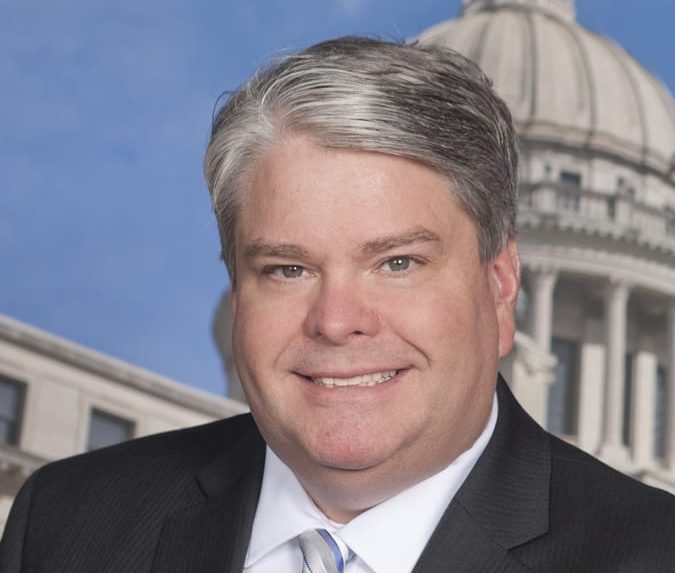
Republican Gov. Tate Reeves outlines his priorities during his State of the State address before a joint session of the Mississippi Legislature on the steps of the State Capitol in Jackson, Miss., Monday, Jan. 30, 2023. (AP Photo/Rogelio V. Solis - Copyright 2023 The Associated Press. All rights reserved.)
The two bills were insurance related, providing changes to the prior authorization process and setting of rate reimbursements for insurers.
Governor Tate Reeves (R) has vetoed the first two bills for the 2023 Legislative session. The vetoes will for SB 2224 and SB 2622, two bills that pertain to insurance.
Provider Reimbursement Rates
SB 2224 would authorize the Commissioner of Insurance to adopt rules and regulations regarding certain provider reimbursement rates. The department could examine and change any inequalities regarding provider reimbursement rates paid by insurers, subcontractors or any other third-party payer administration.

“Mississippi, along with the rest of the nation, is in a healthcare crisis. Unfortunately, patients and healthcare providers in Mississippi are further penalized do to the low reimbursement rates paid by health insurance companies,” said Senator Kevin Blackwell (R), author of the bill. “Mississippi rates are the lowest in the nation. SB 2224 simply allowed the Commissioner of Insurance to adapt rules and regulations relative to provider reimbursement to ensure our providers are appropriately compensated.”
The bill passed the Senate 52 to 0 and was approved in the House 111 to 5. It again passed the Senate on concurrence 52 to 0.
Commissioner of Insurance Mike Chaney (R) also expressed his frustration over the Governor’s veto.

“I am certainly disappointed in the Governor’s veto message for SB 2224 and SB 2622. Both of these bills are consumer-friendly bills that would benefit healthcare providers and consumers in our state,” said Commissioner of Insurance Mike Chaney. “The Governor is sadly mistaken that SB 2224 would have affected Medicare and Medicaid plans as the Department of Insurance does not have jurisdiction over these plans and the bill did not expand that jurisdiction. Senate Bill 2224 would give the Department of Insurance the important tools necessary to ensure that Mississippians would continue to have access to quality healthcare at reasonable rates.”
Chaney went on to add that he has worked to protect consumers and healthcare providers in the state, and will continue to do that, despite the veto. However, he said one of those ways is by leveling the playing field for all insurance carriers in Mississippi.
In Governor Reeves’ veto letter, he notes that the Commissioner would have the authority to mandate that a higher reimbursement rate be set in contracts between insurers and healthcare providers. A $10,000 penalty was included in the legislation for a service provided at a perceived inequitable rate.
“The first one would basically give the Insurance Commission the ability to set rates for all health insurance. They can massively fine private insurance if they aren’t ‘equitable’ enough,” said Reeves when announcing the vetoes on social media. “It’s not what you expect in Mississippi, but that’s why we read every bill closely!”
Reeves goes on to say that the fine would be a violation of Article 3, Section 28 of the Mississippi Constitution which currently prohibits “excessive fines.”
The Governor also addressed concerns that the ability for the Commissioner to set those rates, saying it would contradict federal law when it comes to Medicare and Medicaid. Currently, federal law provides that rates for Medicaid recipients are set through the Centers for Medicare and Medicaid (CMS) and Mississippi’s Medicaid reimbursement is set by the State Plan which is subject to the Legislature.
“SB 2224 has the potential to unwisely increase this tax burden beyond the breaking point in the name of equity,” said Reeves.
Governor Reeves said he believes the legislation was influenced by the dispute between Mississippi Blue Cross Blue Shield and the University of Mississippi Medical Center. He stands firm that the bill would have violated several provisions of the U.S. and Mississippi Constitutions.
Prior Authorization Reform
The second piece of legislation drawing a veto from Governor Reeves is SB 2622 which addressed several technical components of the Medicaid program, particularly the one related to prior authorization.
Prior authorization is the process that is used to determine if the cost of medical care or medication is under an insurance plan. The bill put forward attempted to implement a streamlined process for obtaining that authorization.
“This bill would force insurance companies to give an answer more quickly, which is positive. However, it also had some unintended consequences,” Reeves wrote on social media.
The bill mandated that health insurers make disclosures pertaining to what services require that authorization, the process for obtaining it, and clinical review criteria. It would have required an accessible list of prior authorization procedures and a peer review by specialists in a doctor’s particular field if a procedure was denied. The bill passed overwhelmingly in both chambers by a vote of 49 to 0 in the Senate and 108 to 5 in the House.
“Everybody I’ve talked to was very happy with it, it was a good pro-patient piece of legislation. It’s good for the doctor, it’s good for the patients. It outlines the terms under which a patient is to get their care delivered,” said Senator Walter Michel (R), author of the bill.

Michel added that the bill would in no way limit what an insurance provider could put on the list of prior authorization list, saying it would simply allow doctors to have beforehand knowledge of what procedures will require it.
However, Governor Reeves wrote in his veto letter, that while reforming prior authorization is a worthy goal, he had concerns in the way this particular structure was set up. He firstly disagreed with the legislation allowing the Mississippi State Department of Health (MSDH) to manage rules and regulations of prior authorizations, an action he says they do not have experience in.
“Thus, Senate Bill 2622 has the potential to create an untenable situation in which the Mississippi Department of Health would be called on to make a determination on a request for prior authorization for a procedure or medication being recommended by a medical provider employed by the MSDH and providing care at a county health department,” wrote Reeves in the veto letter.
The Governor went on to say lawmakers should instead empower the Department of Insurance to provide oversight not MSDH.
Senator Michel said he had no problem with changing that provision and putting the regulatory oversight to the Department of Insurance. He said those were actually conversations that came up during the discussions on the bill.
“We originally had the Gold Card provision in this bill and when the provision was in it, that’s why it was under the Department of Health. Then we took that out. It would be fine with me if the insurance commissioner would like to oversee the program,” said Michel.
Governor Reeves also expressed issues regarding the Department of Insurance investigating healthcare fraud as well as unintended negative impacts on the current prior authorization process by limiting parties to an insurance contract and unnecessary administrative expenses. In addition, he noted concerns with mandating health insurers to utilize a team of qualified specialists to evaluate all requests for prior authorization on a specific time frame.
Senator Michel said the Legislature thought it was important that if a particular doctor, like an orthopedic specialist, was recommending a procedure that would require prior authorization and was denied, they should have the ability to speak with another orthopedic trained specialist who was representing the insurance provider.
Michel said the origin of the bill came from a group of physicians who were attempting to get their needs addressed when providing care for patients.
“What they’ve seen in some instances if a person is denied, denied, denied, long enough, then the person will just give up on the procedure being performed. In that instance, I guess you could say the insurance company won the game,” said Senator Michel.
Michel told Magnolia Tribune that it would be up to Lt. Governor Delbert Hosemann to call for an override vote of the veto by the body but he did not indicate whether that was likely to happen or not prior to the end of session.
As for the two vetoes, Governor Reeves said he was hired to closely review every bill as the “last stop” for legislation, something he takes seriously.
“We’re closely reviewing every bill, because that’s what you hired me to do! 76 bills this week – just 2 vetoes! Good folks can sometimes let bad things past the goalie, and we’re the last stop before disastrous consequences like massively increased healthcare costs,” Reeves said. “Glad to do it!”











